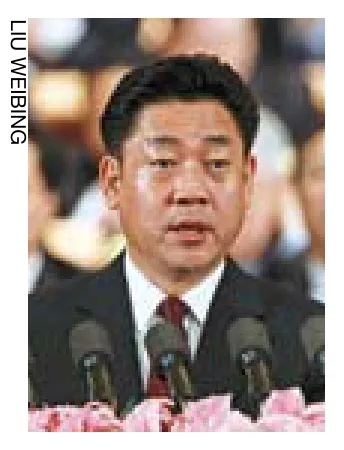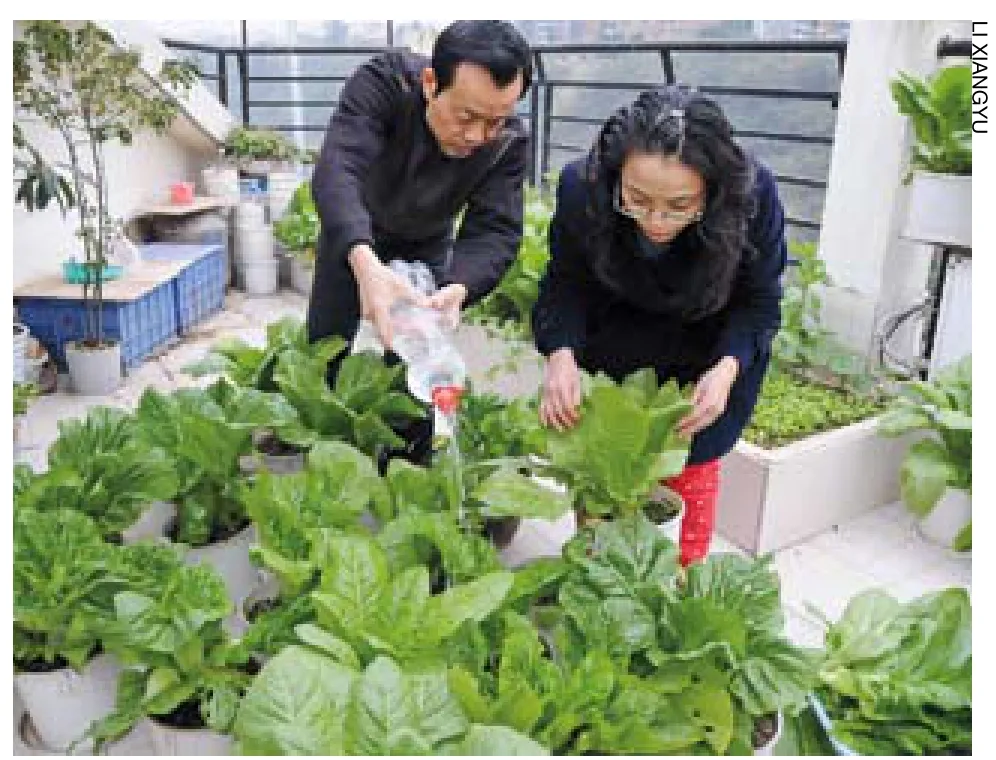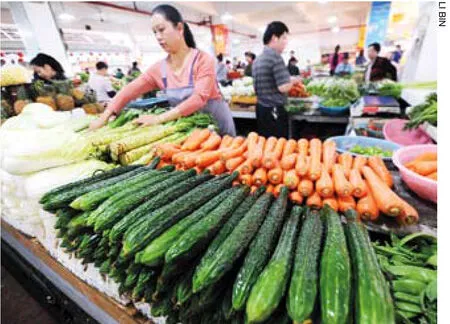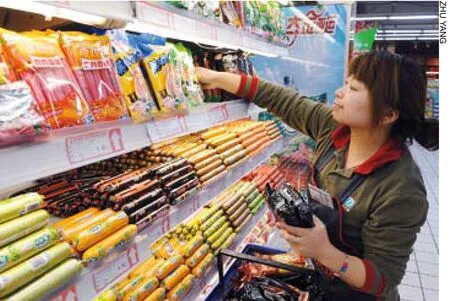Food, Food,Safe Food
2011-03-15YUANYUAN
New scandal triggers debate on solutions to food safety problems in China
By YUAN YUAN
On March 15, the World Consumer Rights Day, China’s national TV broadcaster CCTV said in a live televised program Jiyuan Shuanghui, a subsidiary company of China’s largest meat producer Shuanghui Group, and several other companies were found to have used pigs fed with toxic clenbuterol for their products.
Shares of Shenzhen-listed Henan Shuanghui Investment and Development Co.Ltd. under Shuanghui Group based in Luohe City, central China’s Henan Province, were indefinitely suspended from trading from March 16, after exposure of the scandal.
Clenbuterol is a chemical that can be fed to pigs to prevent them from accumulating fat. It is banned as an additive in pig feed in China because it can end up in the flesh of pigs and is poisonous to humans if ingested.Jiyuan Shuanghui allegedly offered local farmers higher prices for pigs fed with the illegal additive.
This added to the growing list of illegal substances entering Chinese consumers’food chain and raised public concerns about another nationwide health scare similar to the 2008 scandal caused by melaminecontaminated powdered baby formula that killed six babies and sickened nearly 300,000 others.
Root causes
“We are very ashamed of food safety problems,” said Wang Qishan, Chinese Vice Premier, at a panel discussion on March 5 with lawmakers from Shandong Province attending this year’s session of the 11th National People’s Congress (NPC). “We didn’t do a good job, and we feel sorry for that.”
In 2009, the Food Safety Law was enacted after the milk contamination scandal in 2008. In February 2010, the State Council Food Safety Commission was set up, focusing mainly on issues concerning food additives, edible farm products and food processing.
Wang said despite the government’s efforts, food inspection remained weak because of a shortage of staff.

A TOUGH ISSUE:Liu Peizhi, Deputy Director of the Office of the State Council Food Safety Commission,calls for greater efforts in improving food safety at this year’s session of the National Committee of the Chinese People’s Political Consultative Conference on March 9
He said during Premier Wen Jiabao’s recent visit to Henan, an elderly woman gave Wen some peanuts, telling him to eat with assurance as she grew the peanuts herself.
“It is a common phenomenon now,” said Wang. “When I went to suburbs of Beijing,almost all the farmers grow vegetables separately.”
Liu Peizhi, Deputy Director of the Office of the State Council Food Safety Commission, told a meeting on March 9 of members of the National Committee of the Chinese People’s Political Consultative Conference, the top advisory body, China has 448,000 licensed food producers and 80 percent are small businesses employing 10 or fewer workers.
“Farming and animal breeding are mostly carried out by more than 200 million individual farmers,” said Liu. “The problem gave rise to two major food safety hazards∶ pollution generated by human activities and excessive use of additives.”
Liu proposed several measures to improve food safety, including raising the threshold of market access for food companies, boosting government scrutiny over the entire process of food production and marketing and disclosing related information to the public.
Zhu Yicai, an NPC deputy and President of Yurun Group Co. Ltd. in Jiangsu Province, submitted a motion to this year’s NPC session on strengthening food safety management in five consecutive years. “I think the law and regulations alone are not enough to deal with food safety problems,” said Zhu.
Zhu said industrialization was a must to ensure food safety since many food producers were small and not easy to investigate.“We should have a higher threshold for licensing food-producing companies,” said Zhu. “Besides, we should spread food safety knowledge to more people, especially students.”
Zhang Xingkai, an NPC deputy and General Engineer of the China Academy of Safety Science and Technology, agreed with Zhu. He said not only the food processing but also agricultural production should be industrialized. He said marketing should also be involved to set up a complete network for food safety.
Law enforcement
Lawmakers and experts have urged for stronger punishment and improved law enforcement to ensure food safety.

(Left) GREEN ROOF:A couple in Nanchong City, SichuanProvince, water vegetables they planton the roof of their home. It hasbecome a new fashion for urbanresidents to grow vegetables themselvesto eat more naturally and safely

(Middle) SELF DISCIPLINE:A vendor cleans vegetables in a market in Nanning, Guangxi Zhuang Autonomous Region

(Right) OFF THE MARKET:A saleswoman in a supermarket in Jiyuan City, Henan Province,takes hams produced by Shuanghui Group off the shelves on March 19
In February, the NPC Standing Committee amended the Criminal Law,imposing harsher penalties on criminals producing and selling unsafe foods. The amendment introduces the capital punishment as the maximum punishment for serious offenders and raises the minimum penalty for crimes related to the production and sale of tainted food from short-term criminal detention to prison terms of up to five years.
“This may be a big step forward, but how much safer our food can become depends on how seriously the law is enforced,” said Li Hanjin, an NPC deputy. “One of the reasons for the frequent food safety scandals is the punishment is not strong enough to deter illegal deeds.”
Wang Lijun, an NPC deputy and police chief of southwest China’s Chongqing Municipality, proposed a law on food and drug safety, separate from the current Criminal Law and the Food Safety Law.
Jiang Jian, an NPC deputy and coauthor of the motion, is president of a Shandong-based hospital. Jiang said better implementation of the Food Safety Law is “an arduous and long-term task” and requires efforts from all levels of governments.
The joint motion says there must be“heavy and speci fi c penalties” for food safety crimes, which are lacking in the current regulations and laws.
Peng Jian, a criminal lawyer who represented clients in a tainted milk powder case,said food safety was related to local and industry interests, which made law enforcement relatively dif fi cult.
“Melamine had been extensively used in the dairy industry for a long time, but the problem was exposed only after it made thousands of babies sick. It happened because people involved covered up each other’s illegal activities,” Peng said.
Peng also called for measures to ensure reasonable pro fi ts for farmers and reduce the role of the middlemen. He said middlemen always tried to keep purchasing prices for agricultural products down, which induced farmers to turn to illegal means to make money. ■
Food Safety Scandals(2000-11)
1. On December 15, 2000, the Center for Disease Control and Prevention of Jinhua City, Zhejiang Province, confiscated 1,500 kg of sunflower seeds fried with tainted mineral oil. Later, food safety regulators in Fujian, Henan, Guangdong and Hainan provinces found similar contaminated sunflower seeds.
2. On September 3, 2001, more than 6,362 students from 16 schools in Jilin Province fell ill after drinking soymilk with excessive mineral contents.
3. In February 2002, Harbin Xiangxiangniao Food Co. in Heilongjiang Province was found to be using expired moon cake fillings to make rice dumplings. Some of the moon cake fillings had rotted or were damaged by rats.
4. On November 16, 2003, two companies in Jinhua City, Zhejiang Province, were found to add DDVP, a pesticide, while processing ham to protect the meat from mosquito contamination.
5. In April, 2004, more than 200 infants in Anhui Province were diagnosed to have a disease, which caused the infants’ heads grow much bigger than normal ones. It was found that the substandard milk powder produced by a factory in Fuyang City, east China’s Anhui Province,was the cause of the disease.
6. In July 2004, rice with mildew that contains flavacin was found in markets in more than 10 provinces and municipalities.Flavacin is a toxic chemical material that can cause cancer.
7. On March 15, 2005, Sudan 1,a carcinogenic food coloring, was found in spiced drumsticks, spiced chicken wings and strong chickenflavored popcorn from KFC outlets in Shanghai. Later, Sudan 1 was found in food available in KFC outlets in other Chinese cities.
8. In July 2008, 16 infants in Gansu Province who had been fed milk powder produced by Sanlu Group based in Shijiazhuang, north China’s Hebei Province, were diagnosed with kidney stones. By November 2008, the number of victims had exceeded 300,000,with six infants dying from kidney stones and other kidney damage.Melamine was the main cause of the kidney diseases. Milk powder produced by Sanlu Group was found to contain 2,563 mg of melamine per kg, while the allowable amount should be 15 mg.
9. In January 2010, a highly poisonous pesticide, isocarbophos, which had been banned from all use, was found in large stockpiles of cowpeas in south China’s Hainan Province.
10. On March 15, 2011, Shuanghui Group, China’s largest meat producer,and several other companies were found to have used pigs fed with toxic Clenbuterol for their products.
